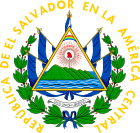
Politics of El Salvador takes place in a framework of a presidential representative democratic republic, whereby the President of El Salvador is both head of state and head of government, and of an executive power is exercised by the government. Legislative power is vested in both the government and the Legislative Assembly. The Judiciary is independent of the executive and the legislature. El Salvador was ranked 5th least electoral democratic country in Latin America and the Caribbean according to V-Dem Democracy indices in 2023 with a score of 0.378 out of 1.
The history of El Salvador begins with several distinct groups of Mesoamerican people, especially the Pipil, the Lenca and the Maya. In the early 16th century, the Spanish Empire conquered the territory, incorporating it into the Viceroyalty of New Spain ruled from Mexico City. In 1821, El Salvador achieved independence from Spain as part of the First Mexican Empire, only to further secede as part of the Federal Republic of Central America two years later. Upon the republic's independence in 1841, El Salvador became a sovereign state until forming a short-lived union with Honduras and Nicaragua called the Greater Republic of Central America, which lasted from 1895 to 1898.
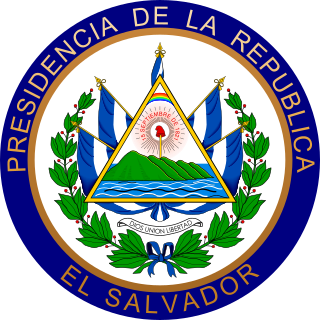
The president of the Republic of El Salvador is the head of state and head of government of El Salvador. The president is also the commander-in-chief of the Armed Forces of El Salvador.

The Nationalist Republican Alliance is a conservative, center-right to right-wing political party of El Salvador. It was founded on 30 September 1981 by retired Salvadoran Army Major Roberto D'Aubuisson. It defines itself as a political institution constituted to defend the democratic, republican, and representative system of government, the social market economy system and nationalism.

The National Coalition Party is a nationalist political party in El Salvador. Until 2011 it was known as the National Conciliation Party. It was the most powerful political party in the country during the 1960s and 1970s, and was closely associated with the Salvadoran military. Julio Adalberto Rivera Carballo, a candidate of the National Conciliation Party, was elected president in 1962, and the next three presidents were also from the party. After the 1979 coup the party declined in influence but continued to exist.

The Christian Democratic Party is a Salvadoran political party. From 2011 to 2012, the party was renamed to Party of Hope before reverting to the Christian Democratic Party. The PDC has been led by Reinaldo Carballo since 2023.
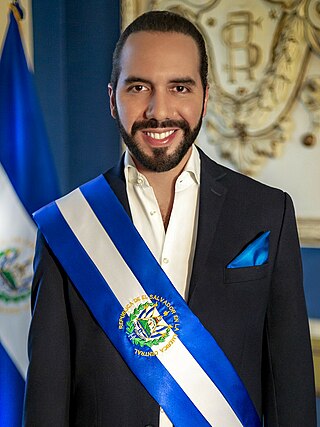
Nayib Armando Bukele Ortez is a Salvadoran politician and businessman who, since 1 June 2019, has been the 81st president of El Salvador. As a member of the Nuevas Ideas political party, Bukele is the first Salvadoran president since 1989 who was not elected as a candidate of one of the country's two major political parties: the right-wing Nationalist Republican Alliance (ARENA) or the left-wing Farabundo Martí National Liberation Front (FMLN), of which Bukele had previously been a member.

Presidential elections were held in El Salvador on 3 February 2019, with Salvadorans electing the president and vice president for a five-year term from 2019 to 2024.
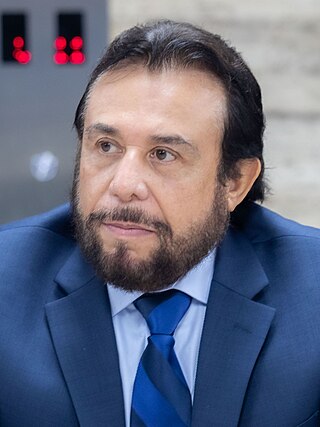
Félix Augusto Antonio Ulloa Garay is a Salvadoran politician, speaker, professor, and lawyer who has been serving as the Vice President of El Salvador since 1 June 2019.
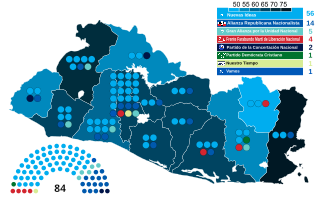
Legislative elections were held in El Salvador on 18 February 2021. Salvadorans elected all 84 deputies of the Legislative Assembly, all 262 mayors of municipal councils of the country's municipalities, and all 20 of El Salvador's deputies to the Central American Parliament (PARLACEN).

Nuevas Ideas is the ruling political party of El Salvador. The party was founded on 25 October 2017 by Nayib Bukele, the then-mayor of San Salvador, and was registered by the Supreme Electoral Court on 21 August 2018. The party's current president is Xavier Zablah Bukele, a cousin of Bukele who has served since March 2020.

The 2020 Salvadoran political crisis, commonly referred to in El Salvador as the numeronym 9F or El Bukelazo, was an incident in El Salvador on 9 February 2020. During the political crisis, Salvadoran President Nayib Bukele sent 40 soldiers of the Salvadoran Army into the Legislative Assembly building in an effort to coerce politicians to approve a loan request of 109 million dollars from the United States for Bukele's security plan for the country.

Irma Michelle Martha Ninette Sol Schweikert de Castro, commonly known Michelle Sol, is a Salvadoran politician and businesswoman who currently serves as the minister of housing of El Salvador. She previously served as the mayor of Nuevo Cuscatlán from 2015 to 2019, and was a candidate for mayor of La Libertad Este in 2024.

Ernesto Alfredo Castro Aldana is a Salvadoran politician and businessman who currently serves as the president of the Legislative Assembly of El Salvador. Castro previously served as a secretary and private advisor to Nayib Bukele from 2012 to 2020 when he was elected as a deputy of the Legislative Assembly from San Salvador in the 2021 legislative election.

General elections were held in El Salvador in February and March 2024. In the first round on 4 February, voters elected the president, vice president, and all 60 deputies of the Legislative Assembly. In the second round on 3 March, voters elected mayors and municipal councils for all 44 of the country's municipalities and all 20 of El Salvador's deputies to the Central American Parliament (PARLACEN).
The following tables list the results of opinion polls for the presidential, legislative, and municipal elections conducted since October 2022 in reverse chronological order for the 2024 Salvadoran general election. The party with the highest percentage is listed in bold and displayed with its background shaded, and the party with the second highest percentage is listed in bold. The lead column shows the percentage between the parties with the first and second highest percentages. For legislative and municipal election polls, projected seat counts, if available, are listed below the percentage.

Rodolfo Antonio Delgado Montes is a Salvadoran lawyer who currently serves as the attorney general of El Salvador. He was appointed as attorney general by the Legislative Assembly in May 2021 after his predecessor, Raúl Melara, was removed by the Nuevas Ideas-led legislature. Prior to his appointment as attorney general, he worked for the Office of the Attorney General from 1995 to 2017 in various roles.

Karim Alberto Bukele Ortez is a Salvadoran businessman and politician. He is a younger brother of and was a presidential advisor to Nayib Bukele, the current president of El Salvador. Bukele has previously worked as Nayib's campaign manager during his 2015 and 2019 electoral campaigns as well as the campaign manager for the Nuevas Ideas political party in 2021. In late-2023, Bukele was considered a likely candidate to succeed Nayib as acting president in the event that he resigned ahead of the 2024 general election, however, Bukele denied that he would succeed Nayib.

Numan Pompilio Salgado García is a Salvadoran politician, lawyer, and businessman who served as a deputy of the Legislative Assembly from 2015 to 2024. He also served as the first secretary of the Legislative Assembly from 2018 to 2021 and the second secretary from 2021 to 2024.
Ibrajim Antonio Bukele Ortez is a Salvadoran businessman. He is a younger brother of and advisor to Nayib Bukele, the incumbent president of El Salvador.



